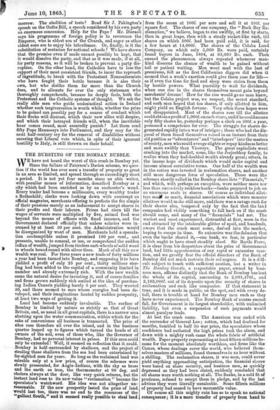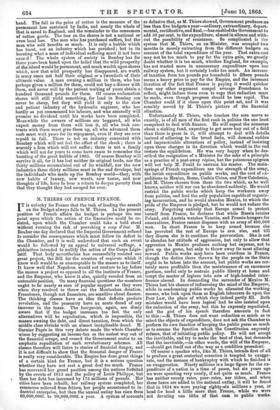THE BURSTING OF THE BOMBAY BUBBLE.
WE have not beard the worst of this crash in Bombay yet. Since the failure of Paterson's Darien scheme, we ques- tion if the world has ever seen: a transfer of property so great in an area so limited, and spread through so exceedingly short a period. It is not yet four months since an able writer, with peculiar means of information, described Bombay as a city which had been enriched as by an enchanter's wand. Every trader had become a millionaire, every wealthy trader a Rothschild; clerks were looking down with contempt on official magnates, merchants offering to prefects the fee simple of their pensions merely as an inducement to accept shares in their profits and their labours. Prices had risen till the wages of servants were multiplied by five, animal food was beyond the means of officers with fixed incomes, and the Government declared officially that unless salaries were in- creased by at least 30 per cent. the Administration would be disorganized by want of men. Merchants held a specula- tion contemptible unless it promised 100 per cent., and peasants, unable to conceal, or use, or comprehend the sudden influx of wealth, jumped from tireless cart-wheels of solid wood to wheels bound round with silver tires. Much dell this new wealth was real. For three years a new trade of forty millions a year had been turned into Bombay, and supposing it to have yielded a profit of only 25 per cent., thirty millions ster- ling had been added to the capital of a community limited in number and already extremely rich. With the new wealth came the natural desire for investing it, and of course families and firms grown suddenly rich smiled at the idea of purchas- ing Indian Consols yielding barely 5 per cent. They wanted 50, and there seemed to men whose energies had been de- veloped, and their imaginations heated by sudden prosperity, at least two ways of getting it.
Land had become suddenly invaluable. The surface of Bombay is limited by nature as strictly as that of Great Britain, and, as usual in all great capitals, there is a narrow area abutting upon the water communication, within which for the sake of convenience all business is transacted. The price of sites rose therefore all over the island, and in the business quarter leaped up to figures which turned the heads of all owners of the soil, even of those who, like the Governor of Bombay, had no personal interest in prices. If this area could only be extended ! Well, it seemed on reflection that it could. Bombay is half-surrounded by shallows, and the project of stealing these shallows from the sea had been entertained by far-sighted men for years. So long as the reclaimed land was saleable only at a low price, of course the schemes were slowly prosecuted, for Anglo-Indians, with the sky as brass and the earth as iron, the thermometer at 90 deg. and cholera always at the door, like very quick returns, but the instant land rose to its new value "reclamation" became the speculator's watchword. His idea was not altogether un- reasonable. If the new prosperity lasted the price of land would last too, there was no end to the resources of the " gallant South," and it seemed really possible to steal land from the ocean at 100/. per acre and sell it at 100/. per square foot. The shares of one company, the "Back Bay Re- clamation," we believe, began to rise swiftly, at first by starts, then in great leaps, then with a steady rocket-like rush, till shares on which 500/. had been paid sold, it is said, for a few hours at 14,000/. The shares of the Colaba Land Company, on which only 5,000 Rs. were paid, certainly found buyers in June, 1864, at 65,000 Rs. each. Then ensued the phenomenon always repeated whenever man- kind discerns the chance of wealth to be gained without toil or patient waiting. Men went mad with the lust of premiums, felt as the first Californian diggers did when it seemed that a week's exertion could give them ease for life— as if even the time for food and sleep were stolen from them by hostile powers. What puerility to wait for dividends, when one rise in the shares themselves meant gain beyond merchants' dreams ! How far the rise would go no man knew, but the Colaba project was, we suspect, the secret standard, and each man hoped that ten shares, if only allotted to him, might yield an English fortune. Very often these hopes were not disappointed. Most of the shares rose till the allottee could obtain aprofitof 1,000/. on each share, and if he couldsecure only fifty shares he, yesterday perhaps a clerk on 300/. a year, possessed a competence for ever. The struggle for shares de- generated rapidly into a war of intrigue ; those who had the dis- posal of them found themselves raised in an instant from their old pdsition as "adventurers" and "interlopers" into the masters of society, men who could avenge slights or repay kindness better and more swiftly than Viceroys. The great capitalists went crashing into the market, some, like the Jeejeebhoy family, to realize when they had doubled wealth already great; others, in the insane hope of dividends which would make capital and income almost correlative terms. One half of the wealth won in the cotton was invested in reclamation shares, and another still more dangerous form of speculation. These were the schemes shortly called in the Bombay share lists "Financials," and which, with perhaps an exception, were neither more nor less than excessively reckless banks—banks prepared to job on an enormous scale in shares. Of course as individual allot- tees maj so much, financial associations which were monster allottees would make still more, and there was a savage rush for their shares also, tempered only by the fact that the land companies had visibly something to fall back on if the crash should come, and many of the "financials" had not. The wariest and most experienced, distrustful at first, were in the end attracted by the intolerable glitter of spoil, and hundreds, aware that the crash must come, dashed into the market, hoping to escape in time. So extensive was the delusion that even the banks shared it,--one bank, we fear, in particular which ought to have stood steadily aloof. Sir Bartle Ercre, it is clear from his despatches about the price of Government laud, had little apprehension of any rapid or extensive reac- tion, and we greatly fear the official directors of the Bank of Bombay did not much restrain their colleagues. It is a diffi- cult subject to touch with sufficient caution, but a writer in The Bombay Gazette, a respectable paper, owned by busi- ness men, affirms distinctly that the Bank of Bombay has lent the whole of its capital, amounting to 2,081,470/., and 2,183,000/. out of its deposits upon the security of shares in reclamation and such like companies. If that statement is true, and it is made in public, on the spot, and with every de- tail, there is trouble at hand for Bombay men such as they have never experienced. The Bombay Bank of course cannot fail, for Government is its largest shareholder, with unlimited liability, but even a suspension of cash payments would almost paralyse trade.
It last the crash came. The American war ended with the surrender of General Lee ; cotton, which had declined for months, tumbled to half its war price, the speculators whose confidence had outlasted the high prices took the alarm, and down with a mighty rush came the whole fabric of artificial wealth. Paper property representing at least fifteen millions be- came for the moment absolutely worthless, and firms like the Camas, whose dealings cover the world, who believed them- selves masters of millions, found themselves in an hour without a shilling. The reclamation shares, it was seen, could never yield anything approaching anticipation, the financial shares were based on share security, and business men, as quickly depressed as they had been elated, suddenly concluded that all shares were worth nothing at all. The Banks, in a cold fit of prudence, refused to accept them in pledge, and by the last advices they were literally unsaleable. Some fifteen millions of property had ceased to have mercantile value. Of course all this mighty ruin has so to speak no national consequence ; it is a mere transfer of property from hand to hand. The fall in the price of cotton is the measure of the permanent loss sustained by India, and nearly the whole of that is saved to England, and the remainder to the consumers of cotton goods. The loss on the shares is not a national or even local loss. The man who has purchased suffers, but the man who sold benefits as much. It is only a bubble which has burst, not an industry which has perished ; but in its bursting what a mass of individual suffering must it not have causal! The whole system of society in Bombay has for three years been based upon the belief that the wild prosperity of the island would be permanent, and much wealth upon shares which, now that wild prosperity has disappeared, are worth in many cases not half their original or a twentieth of their ultimate value. A man owning a million in them, who has perhaps given a million for them, could not buy a dinner with them, and never will by the patient waiting of years obtain a hundred thousand pounds for them. Of course reclamation shares will still yield something, for land in Bombay can never be cheap, but they will yield it only to the slow and patient industry of the hydraulic engineer, who has hardly as yet commenced his labours, and who assuredly will promise no dividend until his works have been completed. Meanwhile the owners of millions are beggared, all who expect money from them will lose it, all who took con- tracts with them must give them up, all who advanced them cash must wait years for its repayment, even if they are ever repaid in full. There is not an industry connected with Bombay which will not feel the effect of the shock ; there is scarcely a firm which will not suffer; there is not a family which will not for years to come have cause to remember the bursting of the great bubble of 1865. Of course Bombay will survive it all, for it has lost neither its original trade, nor the thirty millions accumulated out of its windfall, nor the new industries those thirty millions must in the end develope, but the individuals who made up the Bombay world—they, with new habits of luxury, new wants, new tastes, and new thoughts of life, have to bear a return to deeper poverty than that they thought they had escaped for ever.































 Previous page
Previous page